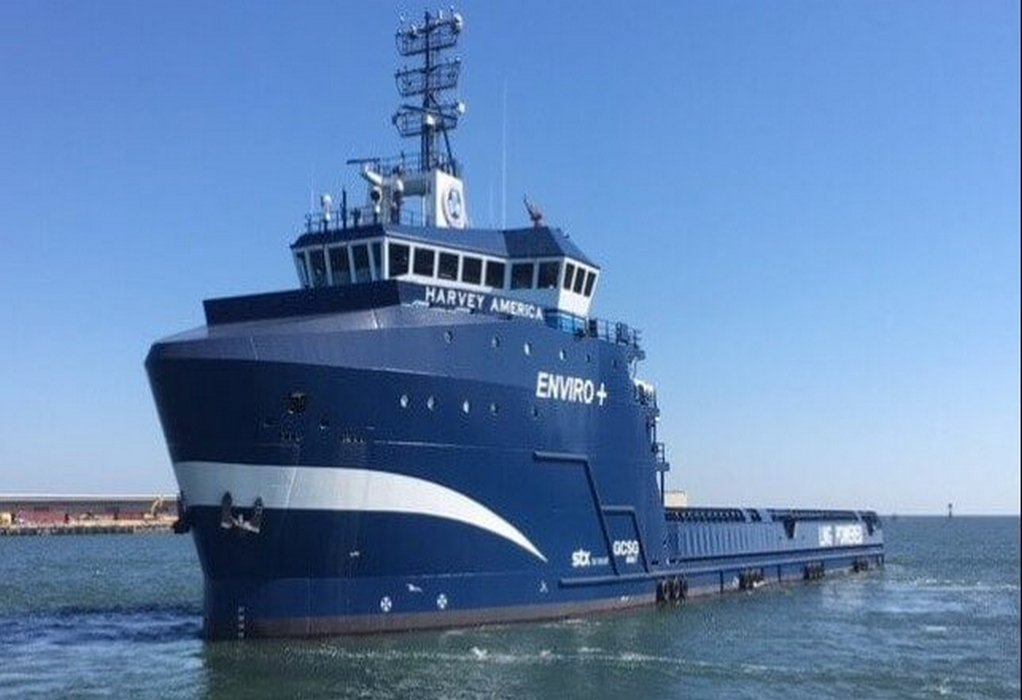U.S. offshore vessel operator Harvey Gulf International Marine reports taking another step in its sustainability effort giving it the world’s first carbon neutral Platform Supply Vessel (PSV). With the introduction of biogas into its operation, Harvey Gulf continues an effort that began seven years ago when they became the first company in North America to operate offshore support vessels powered by liquefied natural gas.
“We always knew the day would come when investors and customers would demand low, or in this case, carbon neutral, zero-emission Platform Supply Vessels,” says Shane Guidry, CEO of Harvey Gulf International Marine. “Today, we own five PSVs all of which can operate carbon neutral utilizing Renewable Liquefied Natural Gas. So, for those oil companies that really want to do all they can to reduce emissions while drilling for oil, we have boats that they can now charter to deliver the drilling rigs’ needs while burning carbon neutral fuel.”
Harvey Gulf introduced the first of its five dual-fuel LNG PSVs in 20215. The 5,300 dwt vessels are 310 feet long using Wartsila engines and azimuthing propellors. After operating as dual-fuel, primarily on LNG and backed up with low sulfur diesel, Harvey successfully added battery power to the first of its PSVs creating the first so-called “tri-fueled” vessels with the company saying it intended to operate only on battery and LNG power, holding the diesel in reserve. Further, after the successful sea trials of the Harvey Energy, they said that all the PSVs would be converted to add the electric battery power system by early 2022.
The first of the tri-fuel vessels has now begun to operate exclusively on battery power and Renewable Liquefied Natural Gas (RLNG), with diesel fuel as a backup. The carbon neutral RLNG being consumed onboard Harvey reports is a blend of low carbon intensity sourced biomethane from the swine and bovine industries. The natural methane produced from the waste/byproduct of the pork and dairy sectors is recovered via digesters. The processing of the waste and extracting of the methane results in negative carbon intensity scored renewable gas.
In 2015, Harvey Gulf completed construction of the first LNG marine fueling facility in North America, which is located at its dock facility in Port Fourchon, Louisiana. The facility consists of 270,000 gallons of LNG storage capacity with the ability to transfer 550 gallons of LNG per minute. The LNG fueling terminal is being used to blend the RLNG with locally available LNG to achieve net-zero carbon neutral fuel burn with a low CI score. Use of the RLNG also enables Harvey’s clients who charter the company’s dual and tri-fueled RLNG vessels to obtain a Carbon Neutral Certificate for their related vessel operations.
While the vessels offer unique advantages, Guidry speculates that they may be the only ones that will ever be operating in the United States due to the high cost of construction. He notes that the vessels cost $113 million each to build saying that he doubts competitors will invest in the current market conditions. “I don’t see that happening, as you will never get a day rate from the end-user that will support the construction cost.“
The addition of the battery power systems and now the switch to RLNG are building on Harvey’s commitment to sustainability. The company has also installed a monitoring system to measure emissions in real-time using it to establish benchmarks that are advising future long-term fuel decisions. Using these steps, Harvey Gulf’s goal is to become the world’s first ESG certified oil and gas vessel operator.
Source: https://www.maritime-executive.com/
Tags: Biogas, Harvey Gulf International Marine, PSV



Recent Posts
New Report Highlights Potential of Voluntary Insetting to Support Maritime Decarbonisation, Calls for Robust Safeguards
Smart Ship Hub achieves industry first with ABS emission reporting
Henkel Rolls Out India’s First Mid-Haul Re-Powered Electric Trucks for Commercial Logistics
Sustainability in Focus at 11th SIAM Automotive Logistics Conclave in New Delhi
L&T Energy GreenTech to Establish India’s Largest Green Hydrogen Plant
JK Srivastava Group and Hynfra Announce $4 Billion Green Ammonia Project in Andhra Pradesh
Andhra Pradesh Unveils Ambitious Green Hydrogen Valley Plan to Lead India’s Energy Transition
South Africa advances plans to decarbonize shipping sector